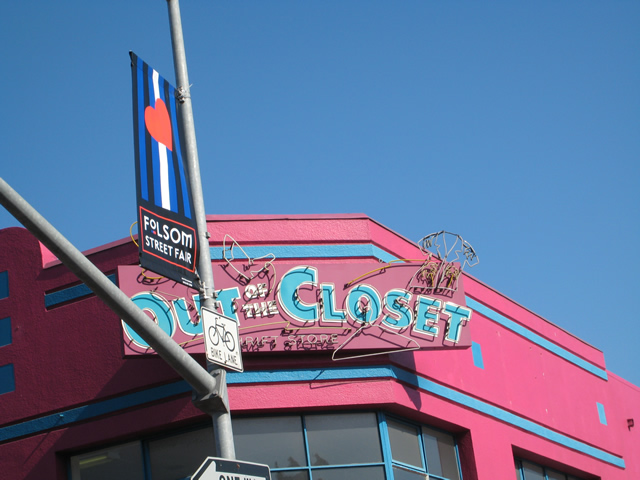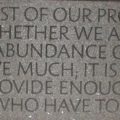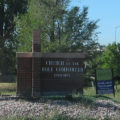The foliage is not as spectacular a New England’s, but you can’t beat that blue sky and a mountain breeze.
Category Archives: living in the USA
The Streets of Colorado
Last Sunday, a cold, dreary fall day in this part of Colorado, I went out canvassing to find out who’s going to vote for Obama. I arrived at the local HQ (a storefront in a strip mall near a Costco) around noon. A guy explained to me at length what I was supposed to do, over my increasing nervousness.
“Do I have to do this alone?” I asked. “I was told someone would be with me.” I didn’t feel confident about knocking on doors by myself. Having spent so much of my life overseas, most recently the last 17 years in Italy, I know that many standard American cultural cues pass me by completely unnoticed. And everyone’s armed in this part of the country (yes, including the liberals) – I didn’t want to miss something that might imply: “Get off my lawn before I blow a hole in you with my 12-gauge.”
Eric, the man who’d been training me, instantly agreed to go with me. On the way we chatted about more personal things and I learned, with no great surprise, that he, too, had been a Sun employee. He got laid off in July, calculated that he had enough money to retire early, and decided to devote his time to campaigning for Obama.
We had pre-printed sheets of paper with names, addresses, and (usually) political leanings for each of the people we were supposed to visit. These were organized by street and side of street (odds and evens), including a map showing the location of the targeted houses.
“Why are we going door to door instead of just calling?” I asked.
Eric’s an engineer, so he has studied the numbers behind his activities.
“This is more effective than calling. Studies show that, for every 14 doors you knock on, you persuade one voter. It takes 200 calls to do the same. This is a swing state, and Jefferson County has traditionally voted Republican. 200 votes could make all the difference here.”
“That’s a lot of doors,” I gulped.
We knocked on 34 doors in about 90 minutes that day. The people we had come to see were all listed as Democrats or undecided. We weren’t expected to call on any Republicans; the thought is that it’s too late in the game to persuade them. Now it’s mostly about making sure that people have their mail-in ballots and know what to do with them, or know where they can go for early voting (which starts Oct 20th in Colorado).
Many of the people on our list had already received their mail-in ballots, and some of those had already sent them in. Three or four refused our polite request to tell us for whom they’d voted. There are still people who feel strongly that this is a private matter, but Eric suspected that they had all voted for McCain and didn’t want to tell us that.
On the other hand, four or five told us they definitely had or would vote for Obama, and one said that her husband would also do so in spite of being a life-long Republican (they were both young).
We did the first street together, with me hanging anxiously behind, not liking the idea of disturbing people on a Sunday, though most took it well. At some places, someone was clearly home but did not answer the door.
Eric pointed out clues to the likely voting habits of the households we visited. A Subaru in the driveway indicated a liberal. On the other hand, 95% of the houses we visited or passed had four-wheel drive vehicles and/or trucks, so those aren’t necessarily a sign of conservatism. Every house seemed to have multiple dogs as well.
One house where I was just as glad no one answered had a jeep in the driveway hand-painted in camouflage, with various aggressive bumper stickers including one that said “Fuck Iraq” – an ambiguous statement at best.
We split the next street, one of us doing odds, the other evens. Eric was trapped for quite a while with a man who wanted to complain about the price of diesel fuel – the only canvasee who had shown much desire for conversation.
Then, frozen to the bone, we went back to the office. Happily, it’s supposed to be sunny and warm when I go out canvassing tomorrow.
Americans’ Phobia of Socialized Medicine
I am baffled by the people I encounter in this country who think that “socialized medicine” is evil. I’m not sure how they arrive at this conclusion. It seems that, for some, anything they can label “socialist” is automatically frightening. But we have state-run fire and police departments and military (among many other things), and the vast majority of Americans would agree that these areas of common human endeavor are best run by government.
Why, therefore, do so many instantly discard the idea that governments can effectively provide health care? Other countries’ governments are managing national health systems quite well. Do we have so little faith in the abilities of our own government?
I’ve seen socialized medicine working for my own family. I lived in Italy for 17 years (my Italian husband is still there), and have written about my (mostly positive) experiences with Italy’s national health system.
My father lives in England with his British wife, and the UK’s National Health Service (NHS) has done very well by them. Just a few weeks ago, Dad had a $60,000 operation – paid for by the British government, and he’s not even a citizen! – to implant an electronic device which interrupts pain signals from his body to his brain: a last-ditch remedy for ten years of extreme, chronic pain due to arthritis. And it’s working.
In Italy, my mother-in-law had a mastectomy within days of a tumor being discovered, and her chemotherapy and related medications were free. When our daughter broke her arm, a compound fracture requiring surgery, the surgery, hospital stay, and follow-up care were free. When I had my own cancer scares, all the tests were done within days, and I paid less than 100 euros for the biopsy. I’ve been under treatment for glaucoma for years; with my doctor’s prescription in Italy, the medicine costs 2 euros a month.
Because health care is universal in these countries, medical privacy need not be a huge concern: you’re going to get treated, no matter what you’ve got. Whereas, in the US, you must jealously guard information about any chronic or genetic condition you may have, for fear that it will damage your chances for employment and insurance.
The Problem of Choice
Some Americans fear that a government-run health system would limit their choices, which is likely true. But is that such a bad thing? Too much choice can be as bad as too little, especially when it requires so much time and knowledge to understand what’s on offer and make an informed decision.
One of the most difficult transitions for me in moving back to the US has been precisely this. I’m an intelligent and highly-educated person, but simply comprehending my health insurance options (and, thank Sun, I have options!) has been largely beyond me so far. I have insurance, but that’s about all I know, pending further study that I haven’t had time for. I can imagine how overwhelming this must seem to someone much younger (or older) and/or less experienced than I.
In Italy, things are a lot simpler. You choose a family doctor from a limited list of local practitioners, most likely someone whose office is convenient to your home. When you’re sick, you visit that doctor during his/her office hours (some by appointment, some you just sit around and wait). If you need a specialist or tests, the family doctor writes an authorization and you schedule an appointment, which will be available later or sooner depending on how busy your local providers are and how urgent your medical situation is. I once scheduled a routine mammogram 8 or 10 months in advance, but when I needed one in a hurry for a suspicious lump, it was performed within 24 hours. (NB: Bi-annual mammograms are free for all women over 45. Socialized health systems are big on preventive medicine, because it makes economic sense.)
And if you want choice in Italy, you can pay out of your own pocket to go to whatever practitioner you like.
Of course, no system is perfect. Malpractice can happen anywhere. My father-in-law was probably killed in Italy by an anesthesiologist too old to be administering an epidural. My aunt’s botched hiatal hernia operation (in Austin, Texas) led to ten years of agony and, eventually, her death. Malpractice suits are rare in Texas, so she never got the money needed to help fix what the doctor screwed up. Penny-pinching by the Medicare system (America’s version of national health, available only to the elderly and used only by those who have no choice) likely exacerbated her problems and also contributed to her death. Being poor and uninsured limits your choices far more than a national health system does.
Given all this, I don’t understand why so many Americans have such a knee-jerk negative reaction to nationalizing health care. Can anyone explain this to me?
On the Phone for Obama
I spent an instructive couple of hours this evening making phone calls on behalf of the Obama campaign. Yes, I am one of those annoying people who interrupts your dinner to ask who you’ll be voting for. (I’m in Colorado, one of the few states where the answer actually matters.)
I’ve had a fear of cold-calling ever since a short-lived, traumatic (and rather funny) attempt at phone sales during my college years, but this wasn’t so bad. Somehow I got the nice people list to call: all women over 60 (some well over), all of them polite. Although the two times I got (presumably) their husbands on the line first, they were rather abrupt.
For the few who were willing to say that they are undecided, I offered to try to answer any questions or concerns they might have, but no one took me up on that. The only woman I spoke to at any length said: “I’m just not sure. He seems so young, though that’s not an issue.” She wasn’t really happy with McCain or Obama, and is disgusted with the recent behavior of both: “They’re fighting like a couple of high schoolers.” I could only glumly agree with that.
“We’re in a rut, and I’m not sure there’s anyone in the whole history of the country who can get us out of it,” she continued. And she wasn’t just talking about the economy.
I empathize, truly I do. You haven’t heard much about Obama from me before, because I would have preferred Hillary. I like her experience and I like her balls, and I would love to see the ultimate glass ceiling broken.
But John McCain won no points from me for selecting Sarah Palin as his running mate. In fact, that move utterly canceled the respect I used to have for him. He thinks I’d vote for Palin simply because she lacks a penis? The utter cynicism of that shows just how little respect he and the Republican party actually have for women. Palin is the polar opposite of Hillary in everything except her chromosomes, and, most worrisome, lacks almost any useful experience. By reason of her sheer lack of competence, the idea of her being McCain’s faltering heartbeat away from the presidency is frightening.
Her religious and social beliefs scare the proverbial bejesus out of me. Bristol Palin is pregnant at 17 as a direct result of her parents’ conservative ideology. You can’t stop teenagers having sex, but, if you’re a sensible and caring parent, you can at least provide them with the knowledge and birth control to prevent them getting pregnant. The failure of abstinence-only sex “education” is starkly illustrated in Palin’s own family, and I’m disgusted (though not surprised) that no one is even mentioning this as an issue. Family privacy be damned: Palin would try to impose this on every teenager in America. We have every right to discuss this – loudly.
Sarah Palin has propelled me hard into the Obama camp, and is the main reason I expect to spend quite a bit of time campaigning for him. But there are things I definitely like about Obama, too. For one, he’s a third-culture kid. Like me, he has a multicultural family and has experienced other countries and cultures by living in them. McCain’s experience of other countries, at least during his young and impressionable years, was of going to war and then being a prisoner of war in Vietnam. I don’t have a window into either man’s psyche, but human intuition tells me which one is likely to have a broader, more nuanced view of the world outside US borders.
And that’s something we desperately need now. The world is too small and too tightly interwoven nowadays for US exceptionalism to be the answer to every international question. We have to think about our role as world citizens, not just American citizens. And I think Barack Obama is far better equipped to do that than John McCain.
Folsom Street Fair 2008
I was in the Bay Area for some conferences, and decided I might as well combine pleasure with business, and take advantage of my last opportunity to stay with Gianluca and Brian in San Francisco before they move to New York. By coincidence, that Sunday was the 25th anniversary of the Folsom Street Fair, which I had attended with Gianluca years ago. The photo at the top is of Out of the Closet, flying the leather community’s black-and-blue flag








